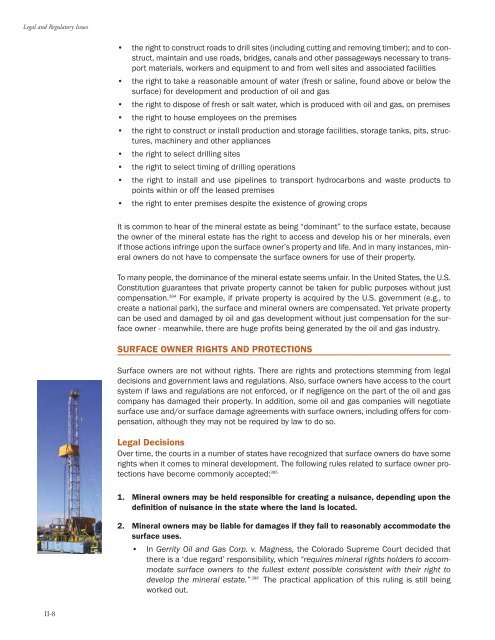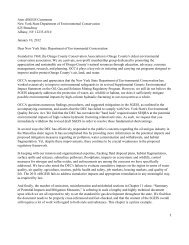Oil and Gas at Your Door? (2005 Edition) - Earthworks
Oil and Gas at Your Door? (2005 Edition) - Earthworks
Oil and Gas at Your Door? (2005 Edition) - Earthworks
You also want an ePaper? Increase the reach of your titles
YUMPU automatically turns print PDFs into web optimized ePapers that Google loves.
Legal <strong>and</strong> Regul<strong>at</strong>ory Issues<br />
• the right to construct roads to drill sites (including cutting <strong>and</strong> removing timber); <strong>and</strong> to construct,<br />
maintain <strong>and</strong> use roads, bridges, canals <strong>and</strong> other passageways necessary to transport<br />
m<strong>at</strong>erials, workers <strong>and</strong> equipment to <strong>and</strong> from well sites <strong>and</strong> associ<strong>at</strong>ed facilities<br />
• the right to take a reasonable amount of w<strong>at</strong>er (fresh or saline, found above or below the<br />
surface) for development <strong>and</strong> production of oil <strong>and</strong> gas<br />
• the right to dispose of fresh or salt w<strong>at</strong>er, which is produced with oil <strong>and</strong> gas, on premises<br />
• the right to house employees on the premises<br />
• the right to construct or install production <strong>and</strong> storage facilities, storage tanks, pits, structures,<br />
machinery <strong>and</strong> other appliances<br />
• the right to select drilling sites<br />
• the right to select timing of drilling oper<strong>at</strong>ions<br />
• the right to install <strong>and</strong> use pipelines to transport hydrocarbons <strong>and</strong> waste products to<br />
points within or off the leased premises<br />
• the right to enter premises despite the existence of growing crops<br />
It is common to hear of the mineral est<strong>at</strong>e as being “dominant” to the surface est<strong>at</strong>e, because<br />
the owner of the mineral est<strong>at</strong>e has the right to access <strong>and</strong> develop his or her minerals, even<br />
if those actions infringe upon the surface owner’s property <strong>and</strong> life. And in many instances, mineral<br />
owners do not have to compens<strong>at</strong>e the surface owners for use of their property.<br />
To many people, the dominance of the mineral est<strong>at</strong>e seems unfair. In the United St<strong>at</strong>es, the U.S.<br />
Constitution guarantees th<strong>at</strong> priv<strong>at</strong>e property cannot be taken for public purposes without just<br />
compens<strong>at</strong>ion. 384 For example, if priv<strong>at</strong>e property is acquired by the U.S. government (e.g., to<br />
cre<strong>at</strong>e a n<strong>at</strong>ional park), the surface <strong>and</strong> mineral owners are compens<strong>at</strong>ed. Yet priv<strong>at</strong>e property<br />
can be used <strong>and</strong> damaged by oil <strong>and</strong> gas development without just compens<strong>at</strong>ion for the surface<br />
owner - meanwhile, there are huge profits being gener<strong>at</strong>ed by the oil <strong>and</strong> gas industry.<br />
SURFACE OWNER RIGHTS AND PROTECTIONS<br />
Surface owners are not without rights. There are rights <strong>and</strong> protections stemming from legal<br />
decisions <strong>and</strong> government laws <strong>and</strong> regul<strong>at</strong>ions. Also, surface owners have access to the court<br />
system if laws <strong>and</strong> regul<strong>at</strong>ions are not enforced, or if negligence on the part of the oil <strong>and</strong> gas<br />
company has damaged their property. In addition, some oil <strong>and</strong> gas companies will negoti<strong>at</strong>e<br />
surface use <strong>and</strong>/or surface damage agreements with surface owners, including offers for compens<strong>at</strong>ion,<br />
although they may not be required by law to do so.<br />
Legal Decisions<br />
Over time, the courts in a number of st<strong>at</strong>es have recognized th<strong>at</strong> surface owners do have some<br />
rights when it comes to mineral development. The following rules rel<strong>at</strong>ed to surface owner protections<br />
have become commonly accepted: 385<br />
1. Mineral owners may be held responsible for cre<strong>at</strong>ing a nuisance, depending upon the<br />
definition of nuisance in the st<strong>at</strong>e where the l<strong>and</strong> is loc<strong>at</strong>ed.<br />
2. Mineral owners may be liable for damages if they fail to reasonably accommod<strong>at</strong>e the<br />
surface uses.<br />
• In Gerrity <strong>Oil</strong> <strong>and</strong> <strong>Gas</strong> Corp. v. Magness, the Colorado Supreme Court decided th<strong>at</strong><br />
there is a ‘due regard’ responsibility, which “requires mineral rights holders to accommod<strong>at</strong>e<br />
surface owners to the fullest extent possible consistent with their right to<br />
develop the mineral est<strong>at</strong>e.” 386 The practical applic<strong>at</strong>ion of this ruling is still being<br />
worked out.<br />
II-8




